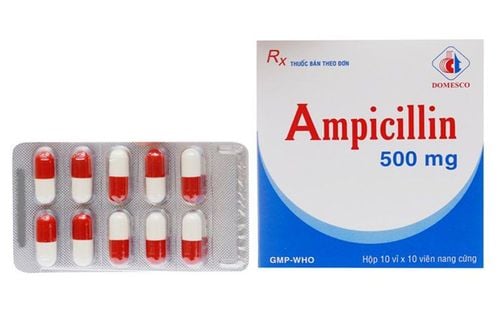This article was professionally consulted by pharmacist Dr. Phan Quỳnh Lan, Director of Pharmacy at Vinmec Healthcare System and Head of the Pharmacy Department at Vinmec Times City International General Hospital.
Augmentin is an antibiotic used for treating various common bacterial infections; however, some patients may experience side effects, such as diarrhoea, nausea, or fungal infections.
1. Side effects of Augmentin
1.1. Digestive disorders
Diarrhea, nausea, vomiting, and indigestion are all potential adverse effects of Augmentin. The incidence of diarrhea when taking Augmentin ranges from 3% to 34%, depending on the dosage regimen. Less commonly, patients may experience colitis (including pseudomembranous colitis and hemorrhagic colitis). To reduce stomach discomfort, Augmentin can be taken with food.
Patients should consult their doctor, pharmacist if they experience severe symptoms, such as dark-colored urine, persistent nausea or vomiting, severe stomach or abdominal pain, yellowing of the skin or eyes, bruising or bleeding, signs of infection (like fever, prolonged soar throat) and signs of unusual fatigue while taking the medication.
Patients should not self-medicate ưith antidiarrheal or pain relief medications to cope with the side effects of Augmentin, as these can worsen the condition. Instead, contact a doctor if any unusual symptoms occur after taking the medication, especially prolonged diarrhea, abdominal pain, stomach cramps, or stools containing mucus or blood.

1.2 Candida infections on the skin and mucous membranes
Continuous use of Augmentin for an extended period can lead to yeast infections or Candida infections on the skin and mucous membranes. Therefore, patients should consult a doctor if they notice white patches in their mouth, experience menstrual cycle disturbances, or observe any unusual symptoms suspected to be bacterial or fungal infections.
1.3. Skin allergies
Skin reactions after taking Augmentin are relatively rare, including rashes, itching, hives, erythema multiforme, and swelling of certain parts of the body (especially the face, tongue, and throat).
More rare but extremely serious skin allergy signs include Stevens-Johnson syndrome, epidermal necrolysis, bullous dermatitis, exfoliative dermatitis, and acute generalized exanthematous pustulosis (AGEP). Although rare, skin side effects of Augmentin should be treated as soon as possible to prevent serious consequences.
1.4. Immune system disturbances
Unexpected effects of Augmentin on the immune system are uncommon; however, patients sometimes can experience severe symptoms such as angioedema, anaphylactic shock, and hypersensitivity vasculitis.
1.5. Blood and Lymphatic system disturbances
Augmentin can potentially cause reversible reductions in white blood cells (including neutrophils), platelet counts, and reversible agranulocytosis, as well as hemolytic anemia. Additionally, augmentin may increase the risk of prolonged bleeding period and prothrombin time, affecting the body's blood clotting process.
1.6. Nervous system disturbances
Side effects of Augmentin on the nervous system include lightheadedness, headaches, or other rare severe signs such as reversible hyperactivity and seizures. Seizures sometimes may occur in patients with impaired renal function or those on high doses for prolonged periods.
1.7. Hepatobiliary disturbances
Augmentin can moderately increase AST or ALT levels in those being treated with beta-lactam antibiotics. Some other very rare side effects related to the hepatobiliary system include dermatitis and cholestatic jaundice.
1.8. Renal and Urinary disturbances
Although uncommon, some patients may experience interstitial nephritis or crystalluria.
Besides the aforementioned side effects, patients taking Augmentin may encounter other symptoms or disorders. Therefore, if you are undergoing treatment with this antibiotic and notice any unusual symptoms, it is advisable to contact your doctor or pharmacist or visit a medical facility for timely examination and treatment to avoid serious complications.
2. Precautions when using Augmentin
During examinations and prescriptions, patients need to inform their doctor or pharmacist about any antibiotic allergies they have, especially allergies to beta-lactam antibiotics (including penicillins and cephalosporins, of which amoxicillin—the active ingredient in Augmentin—is a part). Additionally, the physician should be well aware of the patient’s medical history, particularly any liver or kidney diseases.
Augmentin often contains aspartame as an excipient. Therefore, the medication may affect individuals with phenylketonuria (PKU) or other conditions requiring the limitation of aspartame (or phenylalanine) intake from their daily diet. In such cases, patients should consult their doctor or pharmacist for safe usage guidance.
Additionally, using Augmentin may reduce the effectiveness of certain live bacterial vaccines (such as the typhoid vaccine). Therefore, you should not receive any live vaccines or immunizations while being treated with this antibiotic unless approved by your treating physician.
For pregnant and breastfeeding women, Augmentin should only be used when necessary, as it can pass into breast milk. Consult your doctor for advice on using this medication during pregnancy and breastfeeding.

3. Drugs that may interact with Augmentin
A drug that primarily interacts with Augmentin is methotrexate (commonly used in chemotherapy and immune system suppression).
Drug interactions can alter the mechanism of action of medications, reducing therapeutic effectiveness or increasing the risk of serious side effects. Therefore, before starting treatment with Augmentin, doctors need to be aware of all medications the patient is currently taking to assess the risk of interactions. Additionally, patients should not self-medicate, discontinue, or adjust the dosage of any medication without their doctor's approval.
Although used as a treatment medication, like all other medications, Augmentin also has certain side effects. However, when a doctor decides to use a specific medication for a patient, it means that the medication is truly effective and any potential side effects are within controllable limits.
To arrange an appointment, please call HOTLINE or make your reservation directly HERE. You may also download the MyVinmec app to schedule appointments faster and manage your reservations more conveniently.














